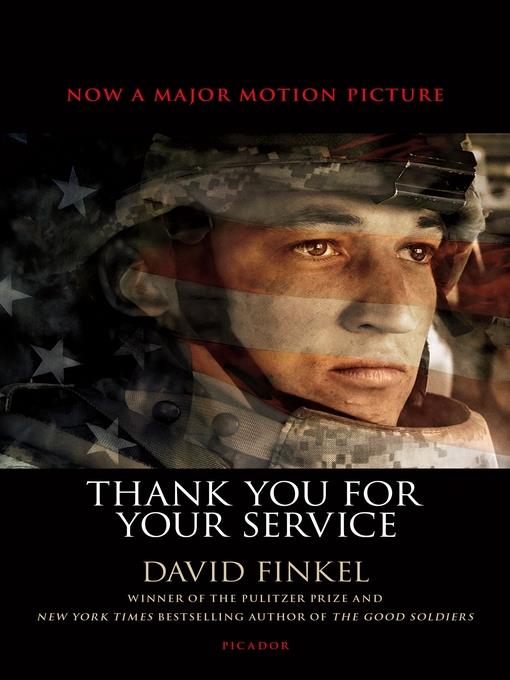
Thank You for Your Service
کتاب های مرتبط
- اطلاعات
- نقد و بررسی
- دیدگاه کاربران
نقد و بررسی

Starred review from July 15, 2013
From April 2007 to April 2008, Finkel, a MacArthur Fellow and Pulitzer Prize–winning reporter with the Washington Post, spent a total of eight months embedded in eastern Iraq with the young infantrymen of the 2-16 as their battalion fought desperately to survive and to make Bush’s troop surge a success. In 2009’s The Good Soldiers (one of Publishers Weekly’s Best Books of the Year), he chronicled their harrowing day-to-day experiences—as their trust in the Iraqi people eroded, their nerves and comrades were shot, and IED after IED exploded. In this incredibly moving sequel, Finkel reconnects with some of the men of the 2-16—now home on American soil—and brings their struggles powerfully to life. These soldiers have names and daughters and bad habits and hopes, and though they have left the war in Iraq, the Iraq War has not left them. Now the battle consists of readjusting to civilian and family life, and bearing the often unbearable weight of their demons. Some have physical injuries, and all suffer from crippling PTSD. And as if navigating their own mental and emotional labyrinths weren’t enough of a challenge, they must also make sense of the Dickensian bureaucracy that is the Department of Veterans Affairs. Told in crisp, unsentimental prose and supplemented with excerpts from soldiers’ diaries, medical reports, e-mails, and text messages, their stories give new meaning to the costs of service—and to giving thanks. Photos. Agent: Melanie Jackson, Melanie Jackson Agency.

Starred review from July 15, 2013
Washington Post writer Finkel delivers one of the most morally responsible works of journalism to emerge from the post-9/11 era. To call this moving rendering of the costs of war a continuation of the author's first book, The Good Soldiers (2009), would be misleading. While Finkel does focus on the men of the 2-16 Infantry Battalion following their actions in Iraq, the breadth and depth of his portraits of the men and women scarred by the 21st century's conflicts are startling. In a series of interconnected stories, Finkel follows a handful of soldiers and their spouses through the painful, sometimes-fatal process of reintegration into American society. The author gives a cleareyed, frightening portrayal of precisely what it is like to suffer with post-traumatic stress disorder or traumatic brain injury and what it is like to have the specter of suicide whispering into your ear every day. Finkel's emotional touchstone is Sgt. Adam Schumann, a genuine American hero who returned from Iraq without a physical scratch on him--but whose three tours of duty may have broken him for good. Schumann's condition, compounded by financial stress, drove a deep wedge between the wounded soldier and his wife, who has struggled to understand why her husband returned a changed man. Finkel also follows the widow of a soldier Schumann tried to save, an American Samoan vet whose TBI threatens to derail his life, and a suicidal comrade unable to overcome his condition, among others. Fighting on the front lines of this conflict are a compassionate case worker, a U.S. Army general who makes it his last mission to halt the waves of suicides, and the director of a transition center whose war should have ended long ago. The truly astonishing aspect of Finkel's work is that he remains completely absent from his reportage; he is still embedded. A real war story with a jarring but critical message for the American people.
COPYRIGHT(2013) Kirkus Reviews, ALL RIGHTS RESERVED.

Starred review from September 1, 2013
Finkel stays with the men of the 2-16 Infantry Battalion, whom he shadowed in The Good Soldiers (2009), who return home to Ft. Riley, Kansas. Plagued with a litany of physical and psychological wounds labeled with such deceptively benign acronyms as PTSD and TBI, these soldiers are still fighting the good fight every day. Only this time, the war takes place within themselves, on the streets of their hometown, in their homes, and in the personnel offices of every employer who can't give them, or won't let them keep, a job. The collateral damage, to use military jargon, is also significant: wives whose anger levels exceed their husbands'; widows unable to accept their fate, who go to unhealthy lengths to keep memories alive. Although the new war recovery push in military health care has become a billion-dollar industry, military suicides have overtaken those by civilians for the first time in history. It is impossible not to be moved, outraged, and saddened by these stories, and Finkel's deeply personal brand of narrative journalism is both heartbreaking and gut-wrenching in its unflinching honesty. When it comes to caring for the nearly 500,000 mentally wounded veterans of the long wars in Iraq and Afghanistan, it is a case of a mission most definitely not accomplished.(Reprinted with permission of Booklist, copyright 2013, American Library Association.)

May 1, 2013
Head of the Washington Post's national reporting team, Pulitzer Prize winner Finkel did an extraordinary job of explaining the Iraq War in The Good Soldiers, a best seller that followed the men of the 2-16 Infantry Battalion as they slogged through 15 months of the thunderous surge. Now he brings the war home, following many of the same men as they try to figure out how to engage again with both family and society.
Copyright 2013 Library Journal, LLC Used with permission.

























دیدگاه کاربران